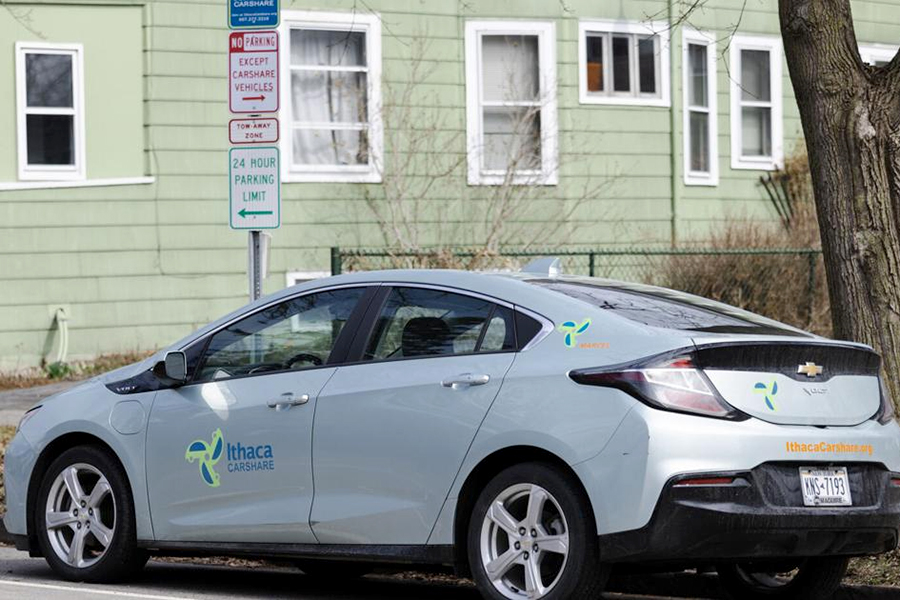The Ithaca Carshare Program, a membership-based nonprofit that offers 24/7 access to vehicles for members, has announced it will reopen services starting in March 2024 after a bill was passed allowing the nonprofit to acquire auto insurance.
The program was put on pause back in May due to a loss of car insurance. The carshare previously received insurance through an out-of-state company, but the agreement ended May 22. A state regulation prevented nonprofits from receiving insurance through out-of-state risk retention groups, which are insurance companies owned by their members.
State Senator Lea Webb introduced bill number S05959 to allow nonprofits throughout the state of New York to receive insurance through risk retention groups. Ithaca Carshare faced the threat of permanent closure if the bill did not pass.
The bill was signed into law by New York Governor Kathy Hochul on Sept. 15 following a unanimous vote by the Legislature. Webb and Assembly member Anna Kelles held a press conference on the same day and thanked Hochul for signing the bill.
“Ithaca Carshare has served the City of Ithaca and its surrounding communities for over 15 years, providing an equitable and sustainable means of transportation to over 1,500 Ithacans who utilize the service and who eagerly await its return,” Webb said at the press conference.
Webb said Ithaca Carshare makes transportation accessible for Ithaca locals who cannot afford to own a car or who choose not to own one to reduce their environmental impact.
Daniel Keough, a former graduate student at Cornell University, said via email that he used the carshare while he was studying at Cornell. Keough said he feels that the carshare provides a critical service to the Ithaca community.
“Having an option to have a car, or a pickup truck for short trips when you need one where you don’t have to pay hundreds of dollars per month for car payments, insurance, hassle with moving it or getting tickets, especially during snowy times of year, is really great,” Keough said.
The process of registration for the program starts with an online application through the carshare website, with the requirements of being 18 years or older and a clean driving record of at least two years. Those who qualify can expect to start driving between 1–3 business days.
The carshare has an initial $20 applicant fee followed by two payment levels, those for people who use the cars less than six hours a month and those who do not. The price is $7.50 a month or $35 a month, respectively, or $75 and $355 for yearly payments.
Other public transportation options in the city are limited, with the TCAT bus system being the only other widely accessible service. The TCAT uses various different prices for rides, with the most popular options including $1.50 a ride or $45 for a monthly pass.
Liz Field, director of the Ithaca Carshare Program, said the program has suffered financial and physical losses as a result of the pause, which has lasted for more than five months.
Field sent an email Nov. 1 to members of the Ithaca community to share more about the lost revenue and ask for donations. In the email, Field said the carshare has lost $470,000 since the pause started in May. The carshare has furloughed most staff members, sold its four oldest cars and received $75,000 in grants, but currently has a more than $100,000 budget gap.
Field asked people to donate to help the carshare reach its $10,000 donation goal by the end of 2023. Field said this will cover the cost of inspections, oil changes, registrations and repairs to help prepare the cars for use.
Fernando de Aragon, director of the Tompkins County Transportation Council, said the Carshare program is part of the Center For Community Transportation and they will work together to ensure the program has as smooth a return as possible.
“We are different entities, but we’re going to help any way we can,” De Aragon said. “We can usually be a good intermediary with state agencies, so we’re going to offer support when they need it.”
The Transportation Council works with several different programs to ensure that Tompkins County is properly served for available transportation, including but not limited to the Carshare, TCAT and Ithaca Bike Rental.
De Aragon also said the Carshare program received immense support at the State Legislature from the community.
“There were close to a thousand bills passed in the last session of the legislature, and we heard from a governor’s staffer that it had become the most contentious bill of them all,” De Aragon said. “They had plenty of people calling to ask why the bill hadn’t been passed yet.”
Field said she hopes that the carshare can move past the shutdown and pursue more innovation after reopening.
“We had expansion plans last year but obviously had to put those on pause, but hopefully, come 2024–25, we’ll have the grants to expand and purchase electric vehicles,” Field said.









